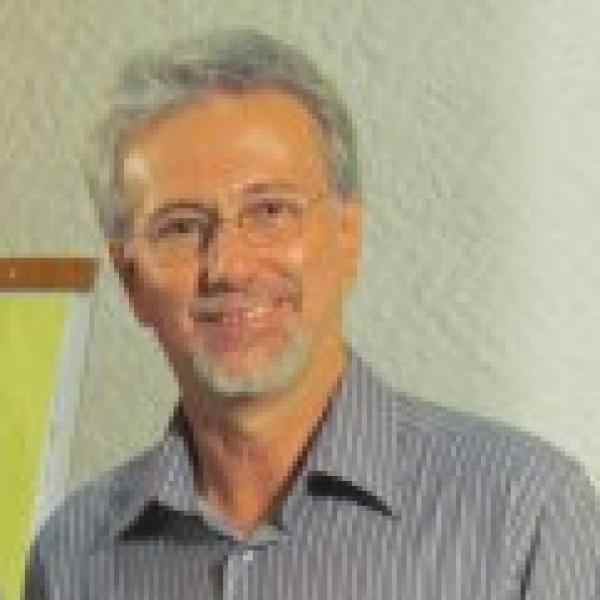Introdução
Oswaldo Setti de Almeida Filho, an engineer by training, is building communities in Brazil by strengthening community ties through shared space and overcoming concerns of adequate shelter.
A nova ideia
Oswaldo and his project Ao Moradia restore the non-physical attributes that bind communities and create a shared commitment among neighbors. He directly engages poor rural communities around the concrete aim of building homes and community centers. Oswaldo’s approach is a new model in community development that focuses on needs, innovation, and sustainability. Ao Moradia (literally, Action Dwelling) begins with an assessment of the community’s specific needs and responds with novel construction methods and a model that invites participation by community members. Oswaldo goes well beyond “a roof over one’s head”: his program looks at the broad spectrum of needs, capabilities, and potential of families and engages poor people—many of them single mothers—as key actors in improving their lives and communities.
Oswaldo sees great promise to spread his model by (1) encouraging its adoption by existing citizen organizations elsewhere, and (2) offering it to financial institutions as a low-cost alternative to building low-income houses. In this way, Oswaldo enables citizens and citizen-led organizations to bid for contracts formerly reserved for outside, private contractors. Volunteers who care about the result assume responsibility for construction, an approach which eliminates the cost of involving contractors and engages the community in reform from within.
O problema
Uberlndia, in the State of Minas Gerais, is a city of 550,000 inhabitants; although the city is considered prosperous, 10.7 percent of its population has incomes below the poverty line. Most of these people live in improvised shacks and small rooms, and are subject to poor hygiene, food, health, education, and working conditions. Prospects for the future are dim: 64 percent of this group is unemployed, 14.5 percent is illiterate, and 53 percent has not completed elementary school. Low schooling is both a symptom and a cause, leading to unemployment and often becoming a root cause of domestic and urban violence. These poor conditions break communities and impede upward mobility.
In these circumstances, families are typically as unstructured as the space they share, creating additional obstacles for improvement of family life. Many are single parent households, run by women who are often on their own without support.
Lack of proper housing in Brazil severely reduces a family’s dignity, creating demoralizing conditions that frequently tear apart even intact families. Further complicating the matter is that since 1991, the overall housing deficit in Brazil has increased 21 percent, resulting in a 22 percent increase in the number of slums.
The Federal Government’s financial housing system establishes a number of rules and restrictions which make it difficult for families with an income of less than three minimum wages to obtain financing agreements. The families need to submit an income statement (despite the fact that most of the work conducted by them is informal) and pay for several documents, taxes and fees at the notary public’s office. This means that many of the families give up along the way, leaving money in the housing budget that the government is unable to spend. This shows the inefficiency of the government’s housing system.
A estratégia
Repairing these fractured communities begins with building physical spaces that can facilitate and embody community strength. The process of working within a community starts with diagnosis, cultivates community engagement, and concludes with the actual construction. For Oswaldo, the first step of the process is selecting the families to participate in the building process. This also requires an invitation to participate in the professional training and income generation programs that complement the project. This way, Oswaldo can make sure people are trained and fully committed to the work.
In this phase, project volunteers diagnose the domestic conditions in which people are living, such as: families headed by women (which currently represent 70 to 80 percent of all families served), number of children, elderly and disabled persons, and housing conditions (wood or clay, with or without power, water, hygiene conditions). These volunteers visit the families on a monthly basis to carry out a diagnostic, and monitor the conditions in which these people live, establish indicators for the work developed by the organization, and provide guidance to these families about their rights as citizens, such as how to obtain documents (birth certificates, identity cards, etc). The work of volunteers, bringing together people from different social classes, enables the delivery of basic food packages to families in situations of risk, which is carried out through the food security program. Today around 150 food packages per month are distributed.
Each week there are workshops of Citizenship and Professional Training, where participants complete courses that ensure their qualification, creating opportunities for professional development, and consequently, income generation for the families. In addition to these key activities, there are parallel interventions that allow for greater integration of the families and the community such as: Youth Formation Workshops (culture, citizenship, school tutors and leisure); Recycling and Income Generation (repairing clothes, in addition to learning how to wash, iron, sew, store and control stocks at a store); Family Training Workshops (including domestic violence, prevention of drug use, and rights and duties of citizens); Reading and Writing for Adults; Support to Pregnant Women (voluntary guidance from professionals in pediatrics, gynecology, psychology and human rights); Seedling and Earthworm Cultures (allowing the family to produce food for partial support of the house in addition to being a source for generating income).
Once the families have been chosen to receive building support, the production of ecological bricks to be used in building the house and community area begins (20 percent and 80 percent respectively). Husbands, wives and children over 16 years old join in the production of bricks, which is done manually, through a press and a mixture of special soil and cement. In this process, there is no burning of wood or coal. The bricks only need to be very well pressed and then exposed to the sun. Afterwards, they are fitted together, without the need for tools or specialized labor.
The next step is building the houses. In this phase, the families go to a professional training course in the areas of civil construction, carpentry and electrical and hydraulic installation. Training brings increased responsibility for the project. The goal is not only ensuring quality, but fostering a sense of ownership and pride in the work being done by and for the community. The houses also have an environmental component that includes vegetable, flower and fruit gardens in each lot. Today, there is a savings of 25 to 30 percent in the cost of each house built, because there is no waste in materials.
Oswaldo has also been negotiating many business sector partnerships with corporate foundations and other parties which enable the base of people served by the project to grow. Currently, Monsanto Fund is supporting the construction of the II Center of Family Formation, which will hold all activities for promoting families—today held in buildings rented or granted by schools and churches. The Brazil Foundation is financing the Brick and Housing Factory; the city of Uberlndia finances the Youth Educational Activities and Professional Training. Oswaldo also has the support of other partners to help the project technically, such as: Citizenship Action (Ao Cidadania), the Federal University of Uberlndia, CEMIG, EMATER, the Municipal Works Secretary, and others. Along with this, he has been talking with the Caixa Econmica Federal, which is a major public financial institution focusing on housing construction. The project attracted the CFE’s interest with its low cost housing construction. The idea would be that Housing Action would serve as a construction manager, with the money going directly to the resident and the citizen sector organization (CSO) supporting the entire construction. This partnership could enable the multiplication of projects nationally and on a large scale.
As his Ao Moradia project grows, Oswaldo intends to increase the production capacity of houses to 24 units/year and to obtain the self-sustainability of the project through actions that generate resources. These include: selling part of the brick production, selling complete buildings through construction cooperatives, utilizing the dormant capacity of Seedling and Earthworm Cultures for ornamental plants and earthworms for sale; and creating partnerships with CSOs from other states that enable them to work at the national level.
A pessoa
After earning an engineering degree, Oswaldo Setti took a job in electrical maintenance in the state of São Paulo. Then he was employed with a multinational civil construction, paving, and mining firm, holding the position of export manager for Latin and Central Americas and the Caribbean for more than eight of the fifteen years he spent with the company.
At the beginning of the 1990s, he participated in a collaborative effort to build a house for a family whose shack had been completely destroyed by an explosion. This experience affected him profoundly, causing him to contemplate the consequences of poverty in Brazil, particularly its myriad housing problems. Additionally, his business trips led him to know the interior of many poor countries in Latin America and the Caribbean, where he witnessed a similar lack of dignity in the way poor people are housed.
In 1992, he relocated and founded his own company, a computer technology firm, which to this date supports him financially. At about the same time, he joined a group of volunteer young people who visited low-income families in city suburb shacks and helped these families raise funds to build their own houses. Ao Moradia was born out of this experience.
Today, Oswaldo Setti holds, in an unpaid, volunteer capacity, the office of president of this organization, dedicating approximately 50 percent of his time to it. Upon election to the fellowship, Oswaldo will transfer management responsibility for the computer technology company to his wife and sons in order to dedicate himself exclusively to activities related to Ao Moradia.




